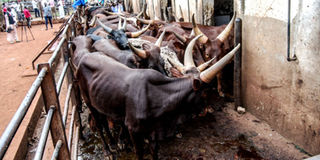State of Jinja abattoir worries beef consumers

Cattle being prepared for slaughtering in Jinja abattoir yesterday. PHOTO BY DENIS EDEMA
Jinja- Residents in Jinja Town are concerned over the state of Jinja main abattoir where cattle, sheep and goats are slaughtered and distributed to various butchers.
The abattoir is located in Industrial Area, Walukuba West Parish, Division in Jinja Municipality.
When Daily Monitor visited the facility on Tuesday, there was flow of animal waste and blood with no exact collection point.
Mr Joseph Okello, a resident of Walukuba, ‘condemned’ the facility saying the unhygienic condition in which the animal are being slaughtered worries beef consumers.
“If you visit the abattoir, you don’t feel like eating or buying meat in this town again. The slaughtering, skinning and separation of the animal parts is unhygienic,” Mr Okello said.
A worker at the abattoir, who preferred not to be mentioned for fear of reprisal, said they are conducting business from a dirty environment, citing lack of water, protective gear and a blocked drainage systems as their biggest challenges.
“During the recent Idd festivities, the Turkish, who had more than 400 head of cattle that were meant to be slaughtered and given out to the Muslim community, expressed concern over the state of the facility,” the worker said.
The chairperson of cattle traders in Jinja, Mr Chrysostom Kagolo, said he could not talk about the abattoir’s current condition, saying: “It is the municipal council to address them since it took over the tender of managing the facility.”
“The issue of the abattoir is not our responsibility as traders, however, there is a general shortage of animals. The population has increased and many people are now consuming beef,” Mr Kagolo said.
Demand
He added that subsistence farming, other than commercial farming, has hiked the prices of animals, which range between Shs1.4m and Shs2m.
Transporting a cow from Karamoja to Jinja, he says, now costs Shs100,000.
In Jinja, one kilogramme of meat is sold between Shs11,000 and shs12,000, while it costs Shs12,000 in Njeru Municipality.
The Jinja municipal public relations officer, Mr Rajab Kitto, confirmed that the abattoir is in a sorry state.
“We are looking at making a total overhaul and re-constructing a modern abattoir. We are aware that it does not match the standards of a modern facility,” Mr kitto said.
He said about Shs40b is expected from the second phase of Uganda Support to Municipal Infrastructure Development project for Jinja Municipal Council, part of which they will be allocated for other construction works including the abattoir.




